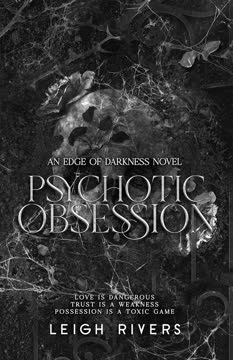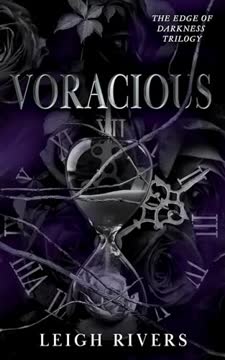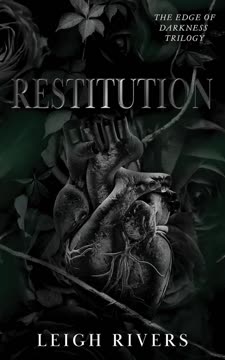Plot Summary
Love's Darkest Edge
Aria Miller, a brilliant but emotionally vulnerable clinical scientist, believes in the redemptive power of love. When she meets Tobias Mitchell, a charming but deeply troubled assistant, she is drawn to his intensity and intelligence. Their connection is immediate, electric, and fraught with danger. Aria, still reeling from a painful breakup and the weight of her work, is seduced by Tobias's attention and the promise of something extraordinary. But beneath the surface, Tobias's love is not gentle—it is possessive, obsessive, and increasingly unhinged. As Aria falls deeper, she begins to sense the darkness lurking behind his devotion, but the thrill and the hope of being truly seen keep her tethered to him, even as warning signs multiply.
The Meeting That Changed Everything
Aria's new assignment brings her to a hospital in the US, where she's fighting for a young patient's life. In a tense meeting, she collides—literally and figuratively—with Tobias, a brilliant assistant with a mysterious past. Their chemistry is undeniable, and Tobias's interest in Aria quickly becomes all-consuming. He inserts himself into her work and life, offering help and companionship, but also pushing boundaries. Aria, flattered and lonely, lets him in, not realizing that Tobias is already researching her, tracking her movements, and manipulating circumstances to keep her close. What begins as flirtation soon becomes a dangerous game of control and surrender.
Obsession Takes Root
Tobias's need for Aria grows into a compulsion. He stalks her online, hires people to dig into her past, and engineers "accidental" encounters. Aria, meanwhile, is torn between attraction and unease. She tries to maintain professional boundaries, but Tobias's charm and vulnerability disarm her. He confides in her about his troubled childhood, his mental health struggles, and his longing for connection. Aria, a natural caretaker, feels responsible for him. Their relationship intensifies, becoming physical and emotionally charged. But Tobias's possessiveness escalates—he wants to own her, body and soul. Aria begins to lose herself, her sense of reality warping under the weight of his obsession.
Lines Crossed, Boundaries Blurred
As Aria and Tobias's relationship deepens, the lines between work and intimacy blur. Tobias becomes her assistant, and their secret affair grows more reckless. They sneak around the hospital, risking their careers and reputations. Tobias's jealousy flares at any mention of Aria's ex, Ewan, or her close friend Gabriella. He isolates Aria from her support system, subtly undermining her confidence and making her dependent on him. Aria, overwhelmed by guilt and desire, rationalizes his behavior as passion. But Tobias's need for control becomes suffocating—he monitors her messages, manipulates her schedule, and punishes her with silence or withdrawal when she resists.
Seduction and Control
Tobias uses sex as a means of domination, pushing Aria's boundaries and exploiting her vulnerabilities. Their encounters are intense, sometimes violent, always laced with the threat of exposure. Aria is both exhilarated and terrified—she craves Tobias's attention but fears his volatility. He alternates between tenderness and cruelty, making her question her own sanity. When Aria tries to assert herself or reconnect with friends, Tobias retaliates with mind games, gaslighting, and emotional blackmail. The relationship becomes a toxic cycle of pleasure and pain, love and fear, with Aria trapped in the web of Tobias's psychotic obsession.
The Descent Begins
Aria's mental health deteriorates as Tobias's grip tightens. He drugs her, sabotages her birth control, and engineers crises to keep her off-balance. Aria's work suffers, her friendships fray, and her sense of self erodes. She experiences blackouts, hallucinations, and paranoia, unsure what is real and what is Tobias's doing. When she tries to break free, Tobias threatens self-harm or violence against others. Aria is caught between her fear of him and her fear of being alone. The outside world begins to notice her decline, but Tobias is always one step ahead, manipulating perceptions and covering his tracks.
Unraveling Sanity
The consequences of Tobias's obsession become catastrophic. Friends are endangered, colleagues suspicious, and Aria's reputation is in tatters. She is accused of addiction, neglect, and unprofessional conduct. Tobias's violence escalates—he harms those close to Aria, including her ex and best friend, to eliminate rivals and cement his hold on her. Aria, desperate and isolated, contemplates drastic measures to escape. She is haunted by guilt, shame, and the fear that she is complicit in her own destruction. The love that once felt redemptive now feels like a curse, a poison she cannot purge.
The Trap Tightens
Tobias's crimes come to light—stalking, assault, even murder. Aria is implicated, her life and career in ruins. She is forced to confront the reality of Tobias's psychosis and her own role in enabling him. In a final act of desperation, Tobias kidnaps Aria, determined to keep her forever or destroy them both. The climax is a harrowing ordeal of captivity, violence, and psychological warfare. Aria must summon all her strength and cunning to survive, protect those she loves, and break free from Tobias's control. The cost is devastating—lives are lost, innocence shattered, and Aria is forever changed.
Shattered Trust, Shifting Loyalties
In the aftermath of Tobias's rampage, Aria is left to pick up the pieces. She is wracked with grief for those lost, guilt for her complicity, and anger at herself for loving a monster. Her relationships with Ewan and Gabriella are strained to the breaking point. The truth about Tobias's manipulation and crimes comes out, and Aria must testify against him. She is torn between her lingering feelings for Tobias and her need for justice. The legal and emotional fallout is immense, and Aria must decide whether to seek redemption or succumb to despair.
Violence and Confession
Tobias is arrested and put on trial, his crimes exposed to the world. Aria is forced to confront him in court, reliving the trauma and facing public scrutiny. Tobias, alternately remorseful and defiant, tries to manipulate Aria one last time. The trial is a spectacle, with Tobias's mother and stepfather testifying, and Aria's own mental health called into question. In a final confrontation, Aria must choose between vengeance and mercy, closure and forgiveness. The verdict is both a relief and a wound—Tobias is institutionalized, but the scars remain.
The Breaking Point
Aria is pushed to her limits—physically, emotionally, and morally. She contemplates ending Tobias's life to save herself and others, but cannot bring herself to do it. In a moment of clarity, she chooses to live, to fight for her own survival and the future of her unborn children. Tobias, realizing he cannot possess her, attempts suicide but is stopped. The cycle of abuse and trauma is broken, but at a terrible cost. Aria is left to mourn what was lost and to rebuild what remains.
Escape and Consequence
Aria escapes Tobias's clutches, but the trauma lingers. She is haunted by nightmares, flashbacks, and the memory of those who died. Her career is in jeopardy, her friendships strained, and her sense of self shattered. But with the help of Ewan, therapy, and her own resilience, Aria begins to heal. She finds purpose in her work, in motherhood, and in honoring the memory of those lost. Tobias is confined to a psychiatric institution, his fate a cautionary tale of love turned lethal.
The Aftermath of Madness
Years pass, and Aria slowly rebuilds her life. She becomes a celebrated scientist and advocate for mental health, channeling her pain into purpose. Her children, Kade and Luciella, are her anchor and her hope. Ewan, once her lover and now her steadfast friend, helps her navigate the complexities of co-parenting and healing. The memory of Tobias lingers—a ghost, a warning, a reminder of the darkness that can hide in love's shadow. Aria is changed, but not broken. She chooses life, hope, and the possibility of happiness.
Healing and Haunting
Aria's journey is one of ongoing struggle and resilience. She faces public scrutiny, professional challenges, and the ever-present threat of Tobias's legacy. Therapy, friendship, and the love of her children help her reclaim her sense of self. She honors Gabriella's memory by founding a charity and dedicating her work to those lost to violence and mental illness. The past haunts her, but she refuses to be defined by it. Aria learns to forgive herself, to accept her scars, and to believe in the possibility of joy.
The Ghosts We Carry
Aria's life is forever marked by what happened, but she refuses to let it define her. She visits Tobias in the institution, allowing her children to know their father in a safe, controlled environment. She is honest with them about the darkness in their lineage, but also about the power of choice and redemption. Aria's work flourishes, her family grows, and she finds peace in the knowledge that she survived. The ghosts of the past are always present, but they no longer control her.
Redemption or Ruin
Tobias, medicated and monitored, shows signs of remorse and self-awareness. He apologizes to Aria, acknowledges his crimes, and encourages her to move on. Aria, though wary, chooses compassion over hatred. She allows her children to have a relationship with their father, under strict supervision. The possibility of redemption, however faint, offers hope. Aria's capacity for forgiveness is both her strength and her burden, a testament to her resilience and humanity.
Facing the Past
Aria is honored for her work, her survival, and her advocacy. She stands before a crowd, remembering those lost and the lessons learned. She speaks of love, loss, and the importance of mental health. The past cannot be changed, but it can be faced, understood, and used to build a better future. Aria's story is one of survival, not just of violence, but of the darkness within and without. She chooses to live, to love, and to hope.
The Price of Survival
Aria's life is not perfect, but it is hers. She has survived the worst and emerged stronger, if scarred. Her children are her legacy, her hope for a better world. The memory of Tobias is a warning and a lesson—the dangers of unchecked obsession, the importance of boundaries, and the power of resilience. Aria's story ends not with a fairy tale, but with the hard-won peace of a survivor who has faced the edge of darkness and chosen to live.
Characters
Aria Miller
Aria is a gifted clinical scientist whose compassion and drive to help others are matched only by her emotional fragility. Haunted by a painful past and a longing for connection, she is drawn to Tobias's intensity, mistaking obsession for love. Aria's journey is one of descent into darkness and hard-won survival. She is both victim and agent, complicit in her own undoing but ultimately resilient. Her relationships—with Tobias, Ewan, and Gabriella—are complex, marked by love, guilt, and sacrifice. Aria's greatest strength is her capacity for empathy, but it is also her greatest vulnerability. She emerges from the ordeal scarred but determined to reclaim her life and protect her children.
Tobias Mitchell
Tobias is a brilliant but deeply disturbed man whose love for Aria is all-consuming and destructive. His childhood trauma, mental illness, and inability to regulate emotion make him both sympathetic and terrifying. Tobias's obsession with Aria drives him to stalking, manipulation, violence, and murder. He is charming, intelligent, and capable of tenderness, but his need for control and fear of abandonment make him lethal. Tobias's relationship with Aria is a toxic dance of domination and dependence. In the end, he is both villain and victim, a man destroyed by his own mind and the darkness of unchecked obsession.
Ewan McElroy
Ewan is Aria's ex-boyfriend and the father figure to her children. Loyal, dependable, and deeply flawed, Ewan is haunted by his own mistakes and the loss of Aria's love. He is a stabilizing force in her life, offering support and forgiveness even after betrayal. Ewan's relationship with Aria is marked by longing, regret, and enduring affection. He is willing to risk everything to protect her, even as she is drawn to Tobias. Ewan's journey is one of redemption, as he learns to forgive himself and build a new life with Aria and their children.
Gabriella McGhee
Gabriella is Aria's confidante, roommate, and emotional anchor. Outgoing, protective, and unafraid to speak her mind, Gabriella is the voice of reason and warning throughout Aria's ordeal. She sees through Tobias's charm and fights to save Aria from his influence, even at great personal risk. Gabriella's loyalty is unwavering, and her tragic fate is a devastating loss for Aria. Her memory becomes a guiding force, inspiring Aria to survive and honor her legacy.
Justin
Justin is Tobias's childhood friend and partner in crime. Manipulative, amoral, and self-serving, Justin enables Tobias's worst impulses and participates in his schemes. He is both a mirror and a foil to Tobias—less intelligent but equally dangerous. Justin's actions escalate the violence and chaos, and his eventual death is both a consequence of his choices and a catalyst for Aria's final act of self-defense.
Violetta Mitchell
Violetta is Tobias's mother, torn between love for her son and horror at his actions. She enables and excuses his behavior, believing she is protecting him. Violetta's complicity is both tragic and infuriating—she is a cautionary figure, a parent unable to confront the reality of her child's illness. Her eventual imprisonment is a reckoning for her role in the tragedy.
Kaleb
Kaleb is Aria's former lover, whose brief affair with her becomes a point of jealousy and violence for Tobias. He is ultimately a victim of Tobias's rage, a reminder of the dangers of obsession and the cost of being caught in its wake.
Ivy Dermot
Ivy is the young patient whose case brings Aria and Tobias together. Her struggle for survival and eventual recovery become a symbol of Aria's capacity for good, even in the midst of darkness. Ivy's story is a counterpoint to the violence and tragedy, a reminder of what is worth fighting for.
Kade and Luciella
The twin children of Aria and Tobias, Kade and Luciella represent both the hope and the fear of the future. They are the product of a love marked by violence and obsession, but also of Aria's resilience and determination to break the cycle. Their relationship with both Ewan and Tobias is complex, shaped by honesty, compassion, and the ongoing struggle to heal.
Doctor Blythe
Blythe is Tobias's stepfather and a figure of authority in the hospital. He enables Tobias's employment and overlooks warning signs, believing he can control or cure him. Blythe's failure to intervene is a cautionary tale about the dangers of denial and the limits of professional detachment.
Plot Devices
Dual Narrative and Unreliable Perspective
The novel alternates between Aria and Tobias's perspectives, immersing the reader in both the victim's confusion and the perpetrator's delusion. This dual narrative blurs the line between love and obsession, reality and manipulation. The use of unreliable narration—drug-induced blackouts, hallucinations, and gaslighting—mirrors Aria's descent into madness and Tobias's fractured psyche. The reader is kept off-balance, never sure what is real or imagined, complicit in the characters' confusion.
Foreshadowing and Symbolism
The story is laced with foreshadowing—ominous warnings, dreams, and repeated phrases ("You're mine," "I'll keep you forever") that signal the coming violence. Symbols of control (handcuffs, cages, drugs) and innocence (Ivy, the twins) are juxtaposed, highlighting the battle between hope and destruction. The motif of mirrors and reflections underscores the theme of duality—Aria and Tobias as two sides of the same coin, love and hate intertwined.
Escalating Stakes and Psychological Tension
The narrative structure is relentless, with each chapter raising the stakes—professionally, personally, and physically. The tension is not just external (violence, kidnapping, murder) but internal—Aria's struggle to distinguish love from abuse, Tobias's battle with his own mind. The use of cliffhangers, time jumps, and fragmented chronology heightens the sense of chaos and inevitability.
The Cycle of Abuse and Trauma
The story is structured around cycles—of seduction and violence, hope and despair, escape and recapture. Aria's journey mirrors the experience of many abuse survivors—denial, complicity, resistance, and ultimately, survival. The narrative does not offer easy answers or redemption, but insists on the complexity of trauma and the possibility of healing.
Analysis
Leigh Rivers crafts a narrative that is as seductive as it is disturbing, forcing readers to confront uncomfortable truths about the nature of desire, control, and the human need for connection. The novel's unflinching portrayal of obsession, abuse, and mental illness is both a warning and a call to empathy—reminding us that monsters are made, not born, and that even the most toxic love can feel like salvation to those who are lost. Aria's journey from victim to survivor is a testament to the resilience of the human spirit, but also a cautionary tale about the dangers of ignoring red flags and the seductive power of darkness. The story refuses easy closure—Tobias is neither wholly villain nor victim, and Aria's scars are both literal and metaphorical. In the end, "Psychotic Obsession" is less a romance than a survival story, a meditation on the price of loving someone who cannot love safely, and a plea for compassion—for ourselves, for those we lose, and for those we cannot save.
Last updated:
Review Summary
Psychotic Obsession received mixed reviews, with ratings ranging from 2 to 5 stars. Many readers found the book emotionally intense and gripping, praising the author's portrayal of complex characters and toxic relationships. However, some felt disappointed by the lack of character development and overemphasis on physical attraction. The non-HEA ending was polarizing, with some appreciating its realism while others felt unsatisfied. Tobias and Aria's relationship sparked debate, with readers divided on whether it was a tragic love story or merely lust-driven obsession.








